人教版高考英语一轮复习语法专题7非谓语动词课件(共47张PPT)
文档属性
| 名称 | 人教版高考英语一轮复习语法专题7非谓语动词课件(共47张PPT) |  | |
| 格式 | ppt | ||
| 文件大小 | 834.5KB | ||
| 资源类型 | 教案 | ||
| 版本资源 | 人教版(2019) | ||
| 科目 | 英语 | ||
| 更新时间 | 2024-02-04 10:58:41 | ||
图片预览



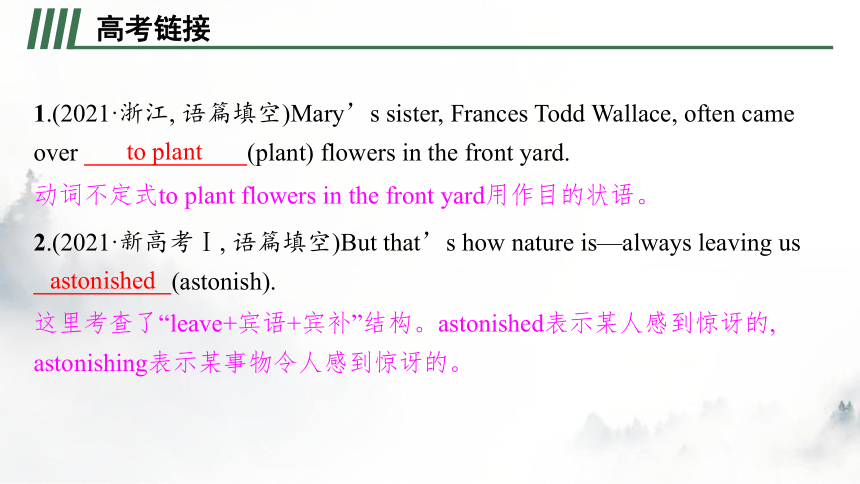
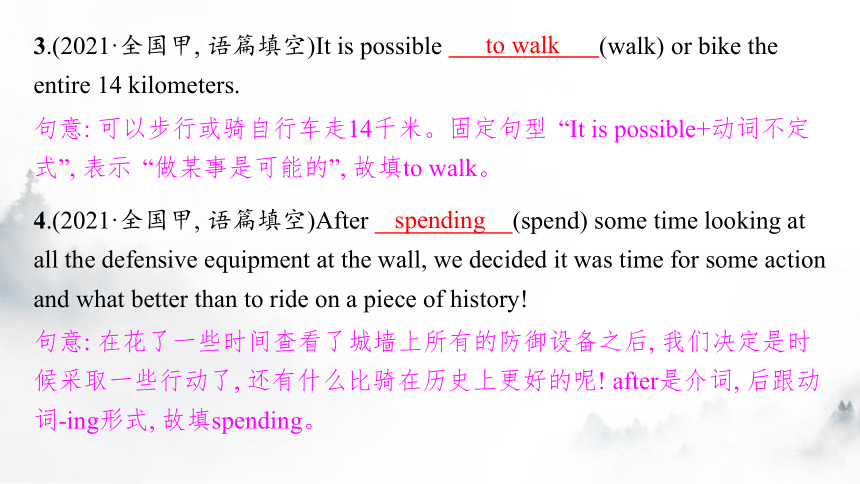
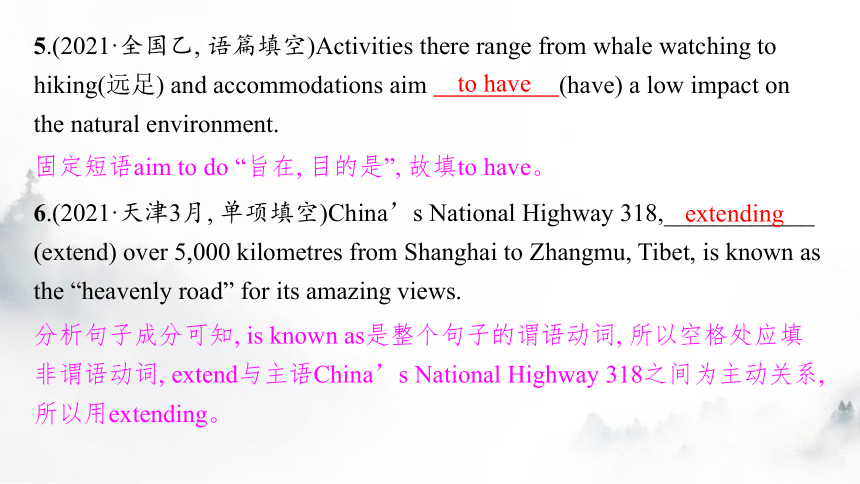
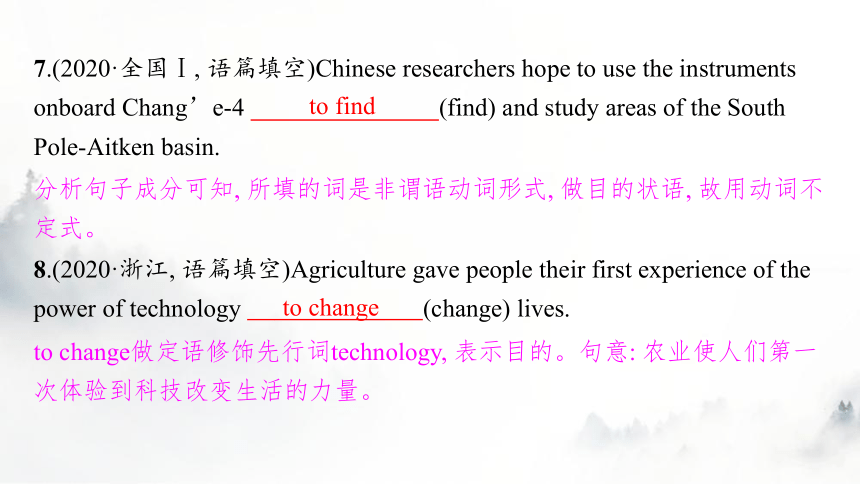
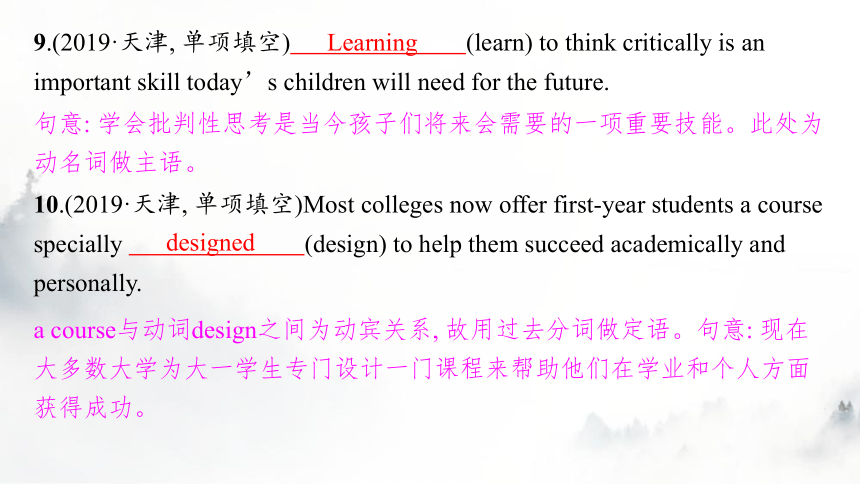


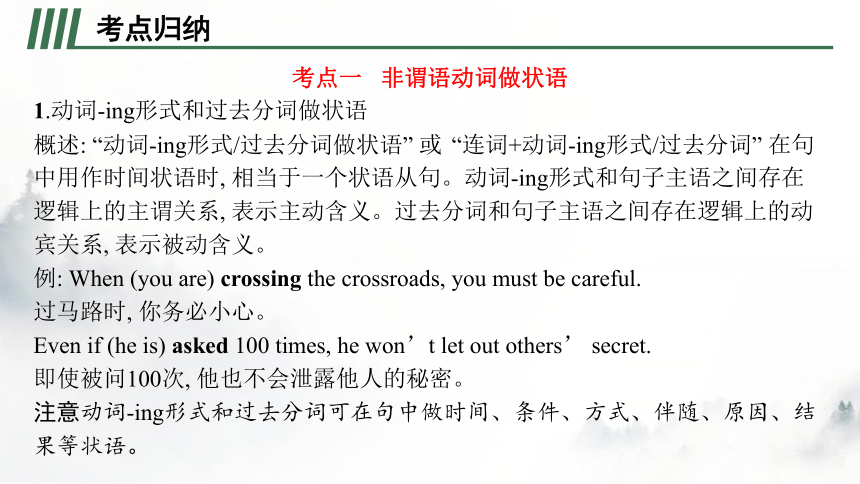
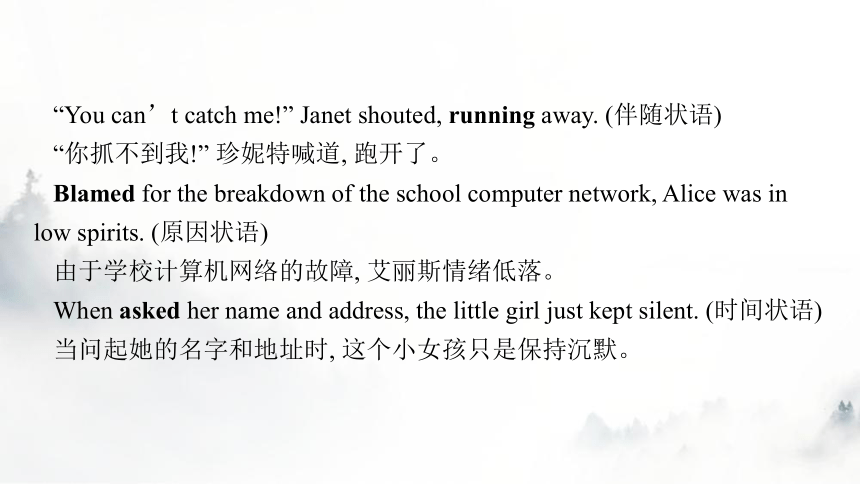
文档简介
(共47张PPT)
语法专项提升
语法专题七 非谓语动词
英 语
内容索引
核心考点 分层突破
专项训练 巩固提升
核心考点 分层突破
高考链接
1.(2021·浙江, 语篇填空)Mary’s sister, Frances Todd Wallace, often came over (plant) flowers in the front yard.
2.(2021·新高考Ⅰ, 语篇填空)But that’s how nature is—always leaving us
(astonish).
to plant
动词不定式to plant flowers in the front yard用作目的状语。
astonished
这里考查了“leave+宾语+宾补”结构。astonished表示某人感到惊讶的, astonishing表示某事物令人感到惊讶的。
3.(2021·全国甲, 语篇填空)It is possible (walk) or bike the entire 14 kilometers.
4.(2021·全国甲, 语篇填空)After (spend) some time looking at all the defensive equipment at the wall, we decided it was time for some action and what better than to ride on a piece of history!
to walk
句意: 可以步行或骑自行车走14千米。固定句型 “It is possible+动词不定式”, 表示 “做某事是可能的”, 故填to walk。
spending
句意: 在花了一些时间查看了城墙上所有的防御设备之后, 我们决定是时候采取一些行动了, 还有什么比骑在历史上更好的呢! after是介词, 后跟动词-ing形式, 故填spending。
5.(2021·全国乙, 语篇填空)Activities there range from whale watching to hiking(远足) and accommodations aim (have) a low impact on the natural environment.
6.(2021·天津3月, 单项填空)China’s National Highway 318,____________
(extend) over 5,000 kilometres from Shanghai to Zhangmu, Tibet, is known as the “heavenly road” for its amazing views.
to have
固定短语aim to do “旨在, 目的是”, 故填to have。
extending
分析句子成分可知, is known as是整个句子的谓语动词, 所以空格处应填非谓语动词, extend与主语China’s National Highway 318之间为主动关系, 所以用extending。
7.(2020·全国Ⅰ, 语篇填空)Chinese researchers hope to use the instruments onboard Chang’e-4 (find) and study areas of the South Pole-Aitken basin.
8.(2020·浙江, 语篇填空)Agriculture gave people their first experience of the power of technology (change) lives.
to find
分析句子成分可知, 所填的词是非谓语动词形式, 做目的状语, 故用动词不定式。
to change
to change做定语修饰先行词technology, 表示目的。句意: 农业使人们第一次体验到科技改变生活的力量。
9.(2019·天津, 单项填空) (learn) to think critically is an important skill today’s children will need for the future.
10.(2019·天津, 单项填空)Most colleges now offer first-year students a course specially (design) to help them succeed academically and personally.
Learning
句意: 学会批判性思考是当今孩子们将来会需要的一项重要技能。此处为动名词做主语。
designed
a course与动词design之间为动宾关系, 故用过去分词做定语。句意: 现在大多数大学为大一学生专门设计一门课程来帮助他们在学业和个人方面获得成功。
11.(2019·江苏, 单项填空) (enjoy) the convenience of digital payment, many senior citizens started to use smart phones.
12.(2019·全国Ⅰ, 语篇填空)Scientists have responded by (note) that hungry bears may be congregating around human settlements, leading to the illusion that populations are higher than they actually are.
To enjoy
To enjoy the convenience of digital payment为动词不定式做目的状语。句意: 为了享用数字化支付的便利, 许多老年人开始使用智能手机。
noting
所填的词位于介词by后面做宾语, 所以用动词-ing形式。
13.(2019·全国Ⅱ, 语篇填空)When we got a call (say) she was short-listed, we thought it was a joke.
saying
句中的谓语动词是got, 所以say应该用非谓语动词形式, say和call有逻辑上的主谓关系, 所以用动词-ing形式。
考点归纳
考点一 非谓语动词做状语
1.动词-ing形式和过去分词做状语
概述: “动词-ing形式/过去分词做状语” 或 “连词+动词-ing形式/过去分词” 在句中用作时间状语时, 相当于一个状语从句。动词-ing形式和句子主语之间存在逻辑上的主谓关系, 表示主动含义。过去分词和句子主语之间存在逻辑上的动宾关系, 表示被动含义。
例: When (you are) crossing the crossroads, you must be careful.
过马路时, 你务必小心。
Even if (he is) asked 100 times, he won’t let out others’ secret.
即使被问100次, 他也不会泄露他人的秘密。
注意动词-ing形式和过去分词可在句中做时间、条件、方式、伴随、原因、结果等状语。
“You can’t catch me!” Janet shouted, running away. (伴随状语)
“你抓不到我!” 珍妮特喊道, 跑开了。
Blamed for the breakdown of the school computer network, Alice was in low spirits. (原因状语)
由于学校计算机网络的故障, 艾丽斯情绪低落。
When asked her name and address, the little girl just kept silent. (时间状语)
当问起她的名字和地址时, 这个小女孩只是保持沉默。
Given another chance, I would make greater progress. (条件状语)
再给我一次机会, 我会取得更大的进步。
He just did everything as told, so he was not to blame for the accident. (方式状语)
他只是按指示做了一切, 所以这项事故不该怪他。
He devoted most of his spare time to playing computer games, making him cut off from friends. (结果状语)
他把大部分业余时间都花在玩电脑游戏上, 使他与朋友断绝了联系。
2.动词不定式做状语
(1)动词不定式做原因状语时常用于下面的句型中: 主语+系动词+形容词+动词不定式(to do), 句型中的表语形容词往往是happy, surprised, excited, pleased, disappointed, sad, sorry, shocked, upset等表示情绪或者心理状态的词, 因此动词不定式表示的是“引起某种情绪的原因”。
He felt disappointed to hear that his proposal was turned down again.
听说他的提议再次遭到拒绝, 他很失望。
Jack was excited to have been chosen captain of the team.
杰克因为当选为队长而激动。
(2)动词不定式做目的状语:
I have come here to ask you for some advice.
我来这儿是为了向您征求点建议。
(3)动词不定式做结果状语(表示出乎意料的结果)
He lifted a stone, only to drop it on his own foot.
他搬起一块石头, 结果却砸了自己的脚。
He left home on a rainy night, never to return.
他在一个雨夜离家出走, 再也没有回来。
比较Many highways have been completed, making it easier to travel throughout China. (动词-ing形式表示意料之中的结果)
(4)动词不定式做修饰性状语(主动形式表示被动含义)
This sentence is easy to understand. 这个句子很容易理解。
3.独立主格结构
概述: 狭义的独立主格结构指带有自己逻辑主语的非谓语动词短语, 一般在句中做状语。
Its top cut off, the bottle acts as a vase now.
顶部削掉了, 这个瓶子现在当花瓶了。
The boss entered the conference hall, several managers following him.
老板进了会议厅, 后面跟着几个经理。
I pay you most of the salary this year, the rest to follow next year.
我今年付你大部分工资, 其余的明年给你。
考点二 非谓语动词做定语
1.动词不定式做定语主要用于以下四种情况:
(1)被修饰的名词前有序数词时, 后面用动词不定式做定语。
He is always the first person to come and the last to leave.
他总是第一个到达最后一个离开。
(2)被修饰的名词前有形容词的最高级时, 后面用动词不定式做定语。
She was the youngest girl to win this prize.
她是获得这个奖项的最年轻的女孩。
(3)名词或代词后面做定语的非谓语动词表示的动作尚未发生时, 用动词不定式。
We are eager to know the news to be announced.
我们急于想知道要宣布的消息。
(4)某些名词的同根词后面接不定式, 该名词后面常用动词不定式做定语。
She has the ability to look after herself.
她有能力照顾好自己。(be able to do sth)
2.动词-ing形式和过去分词做定语
(1)动词-ing形式做定语:
①表示被修饰名词和分词之间为主谓关系。
The wild flowers looked like a soft orange blanket covering the desert.
野花看上去就像覆盖着沙漠的柔软的橘黄色毯子。
②用来说明名词的用途或属性。
There is a swimming pool in our school.
我们学校有个游泳池。
The old man has to walk with the help of a walking stick.
这位老人得借助于拐杖走路。
(2)过去分词做定语表示被修饰的名词与分词之间为动宾(或被动)关系。
Are these the books given away to us by the old professor
这些书是那位老教授捐赠给我们的吗
提示动词-ing形式和过去分词做定语时相当于一个定语从句。
I was told that there were about 50 foreign students studying Chinese in the school. →I was told that there were about 50 foreign students who were studying Chinese in the school.
有人告诉我大约有50个外国学生在这所学校学习汉语。
拓展表示已经发生的(被动的)动作用过去分词做定语; 表示正在进行的(主动的)动作, 用动词-ing形式做定语。动词-ing形式的被动式为being done; 动词不定式的被动式为to be done。
the meeting being held at present正在举行的会议
the meeting held yesterday昨天举行的会议
the meeting to be held tomorrow明天即将举行的会议
考点三 非谓语动词做主语
1.动词-ing形式做主语: 动词-ing形式用作主语时, 表示一个经常性、习惯性的动作或者一种客观情况。
Going to bed early and getting up early is a good habit.
早睡早起是个好习惯。
Knowing your own strengths and weaknesses will help you succeed.
了解自己的强项和弱点将有助于你成功。
拓展(1)动词-ing形式的否定式是not doing
(2)被动式是being done
(3)完成式是having done
(4)完成被动式是having been done。
(5)动词-ing形式的复合结构: sb’s(形容词性物主代词或名词所有格) +doing, 当它不在句首时, 也可以用“人称代词的宾格形式或名词的普通格+doing”代替。
Being kept waiting is an unpleasant experience.
等别人是一件很不愉快的体验。
Your coming late again made the boss upset.
你再次迟到让老板很不舒服。
Do you mind my/me/Mike’s/Mike opening the window
您介意我/迈克打开窗子吗
注意动词-ing形式的完成式(having done)一般不用作句子主语。
2.动词不定式做句子主语时一般表示某一次具体或特定的行动或者一个尚未发生的动作。
Swimming is a good form of building up our body, but to swim tomorrow is impossible, since I’m not available then.
游泳是锻炼身体的好方法, 但明天游泳是不可能的, 因为那时我没空。
3.在很多句型中, 常用it做形式主语, 不定式或动词-ing形式做真正主语。
It is/was no good/not any good/no use/useless arguing with him.
跟他争论是没有好处/用处的。
It is impossible for him to arrive here within two hours.
他不可能两小时之内赶到这儿。
It is a good habit to get up early in the morning.
早上早起床是个好习惯。
提示for sb to do 是动词不定式的复合结构。
考点四 非谓语动词做宾语
1.动词-ing形式做宾语
(1)动词-ing形式可用作介词或及物动词的宾语。
You shall not enter the office without being permitted.
未经允许你不能进入办公室。
The bird was lucky enough to escape being caught.
那只鸟很幸运, 没有被抓住。
注意下列动词必须接动词-ing形式做宾语, 不能接动词不定式做宾语: admit, advise, avoid, allow, appreciate, advocate, consider, deny, delay, enjoy, escape, excuse, finish, fancy, forbid, give up, imagine, insist on, keep, keep on, miss, mind, oppose, practise, permit, postpone, put off, quit, risk, recommend, suggest, can’t stand等。
(2)有些句型中用it做形式宾语, 动词-ing形式做真正宾语。
I find it no use/useless/no good advising him to try again.
我发现建议他再试一次没有用处/好处。
(3)want, need, require后接动词-ing形式做宾语, 用主动形式表示被动含义。
These flowers need/require/want watering(=to be watered).
这些花需要浇了。
2.动词不定式做宾语
He refused to answer my second question.
他拒绝回答我的第二个问题。
考点五 非谓语动词做表语
1.分词做表语: 一些形容词化了的动词-ing形式做表语时, 表示主语给别人的感觉, 意为 “令人……的”; 动词-ed形式做表语时, 表示主语自身的感觉, 意为“感觉……的”。
Her speech is really inspiring.
他的讲话真是鼓舞人心。
I’m interested in playing chess on the Internet.
我对在网上下棋感兴趣。
2.动词-ing形式做表语: 动词-ing形式做表语时表示的是经常性、习惯性的动作或者抽象的动作。
My hobby is collecting stamps in my spare time.
我的爱好是在业余时间集邮。
3.动词不定式做表语: 常表示将来要发生的动作。
My dream is to become an engineer in the IT field.
我的梦想是成为一名信息技术领域的工程师。
What I did to him was to give him a little push.
我只是轻轻地推了他一把。
考点六 非谓语动词做补足语
1.动词-ing形式和过去分词做宾语补足语
动词-ing形式做宾语补足语时, 宾语和宾语补足语之间为主谓关系, 表主动含义; 过去分词做宾语补足语时, 宾语和宾语补足语之间为动宾关系, 表被动含义。
I’m sorry for having kept you waiting outside for so long.
我很抱歉让您在外面等了这么久。
He hurried to his office, leaving the breakfast untouched.
他急急忙忙地去了办公室, 放着早饭没动。
注意已经形容词化了的动词-ing形式做宾语补足语, 表示宾语给别人的感受, 其动词-ed形式则表示宾语的自身感觉。
I find this kind of games encouraging.
我发现这类游戏令人振奋。
We tried to make/get him interested in the work.
我们尽力使他对这份工作感兴趣。
2.动词不定式做宾语补足语
We don’t allow anyone to smoke in the area.
我们不允许任何人在这个区域抽烟。
注意(1)感官动词listen to, hear, look at, see, observe, notice, feel 等后面接动词-ing形式做宾语补足语时, 表示 “看到/听到/感觉到正在干某事”; 接动词-ed形式做宾语补足语时, 表示被动含义, 接省去to的不定式做宾语补足语时, 表示动作的全过程。
I felt someone patting me on the shoulder.
我感觉有人在拍我的肩膀。
We would like to see the plan carried out next month.
我们希望看到计划下个月执行。
He notice the stranger enter the room and sit down.
他注意到那个陌生人进了房间并坐了下来。
(2)使役动词have后面接动词-ing形式做宾语补足语时, 表示 “让……一直干某事” 或 “允许/容忍某人干某事”; 跟动词-ed做宾语补足语时, 为动宾关系, 意为“使……遭受” “请人干某事” “使某事被完成”; 跟省去to的动词不定式做宾语补足语时, 意为“吩咐某人干某事”。
He had the fire burning the whole night.
他让火烧了一整夜。
I won’t have you behaving so badly.
我不会允许你表现如此恶劣。
He had his pocket picked on the bus yesterday.
他昨天在公共汽车上被人扒了口袋。
We shall have the task fulfilled as soon as possible.
我们将尽快完成任务。
The old lady had fresh milk delivered to her house every morning.
那位老太太叫人每天早晨把新鲜牛奶送到她家。
I will have my secretary show you around our company.
我让秘书带你们参观我们公司。
专项训练 巩固提升
Ⅰ.单句语法填空
1.(2021·山东临沂高三期末检测)Enes Sahin suggested (set) aside a day for planting trees in Turkey.
2.(2021·山东济南外国语学校高三上学期期末)The responses to the question were various, even some quite funny ones (include).
setting
动词suggest后面跟动词-ing形式做宾语。
included
even some quite funny ones included为独立主格结构, ones与include之间为动宾关系, 用过去分词表示被动含义。
3.(2021·山东潍坊高三上学期期末)The inner circle of bluestones, each
(weigh) about 4 tons, was built first.
4.(2020·北京门头沟高三二模)The new spacecraft, which has not yet been named, will orbit beyond Low-Earth Orbit (LEO), (carry) four to six astronauts.
weighing
each (weigh) about 4 tons为独立主格结构, each与weigh之间为主谓关系, 故用动词-ing形式。
carrying
表示主动和进行用动词-ing形式。
5.(2020·广西南宁高三二模)Cao Yuan, a 22-year-old Chinese doctoral student in physics, was on top of the most important scientists named by the journal Nature in 2018 for (discover) a “magic angle” in graphene(石墨烯).
discovering
for为介词, 后面须用动词-ing形式做宾语。
6.(2020·浙江宁波高三模拟)Steven hiked the 50-foot distance between him and the fridge and was shocked (find) that it was filled with beers.
to find
to find...做原因状语, 解释引发shocked这一情绪的具体原因。
7.(2020·山东菏泽高三联考)Bullying among elementary, middle and high school students has become an increasingly talked-about subject in Japan, with many parents and educators (struggle) to find the best way to deal with the problem.
struggling
struggling在 “with+宾语+宾补” 结构中做宾语many parents and educators的补足语, 表示主动。
8.(2020·山东淄博4月模拟)Travellers can be scanned on cameras
(use) facial recognition.
using
此处用动词-ing形式做方式状语。
9.Skilled workers also combine various hardwoods and metal (create) special designs.
to create
此处用动词不定式做目的状语。
10.If you find something you love doing outside of the office, you’ll be less likely (bring) your work home.
to bring
be likely to do sth为固定句型, 意为 “可能干……”。
11.Failing (turn) in your homework on time will directly affect your grade for a certain course.
to turn
fail to do...意为 “不能干成某事”。
12. (separate) from other continents for millions of years, Australia has many plants not found in any other country.
Separated/Having been separated
Separated或Having been separated...做原因状语, 表示被动和完成。
13.I send you 100 dollars today, the rest (follow) in a year.
14.He glanced over at her, (note) that though she was tiny, she seemed very well put together.
to follow
to follow表示尚未发生的动作。
noting
noting...在句中做伴随状语, 表示主动和进行。
15. (lose) in the mountains for a week, the two students were finally saved by the local police.
Lost
Lost...做时间状语, 表示被动和完成。
16.I think you’ll grow (like) him when you know him better.
to like
grow to do...意为 “逐渐开始干某事”。
17.The manager, (make) it clear to us that he didn’t agree with us, left the meeting room.
having made
make it clear这一动作发生在句子谓语动词之前, 故用现在分词的完成式。
18.Generally (speak), the more expensive the camera, the better its quality.
speaking
generally speaking意为 “一般来说”。
19.He got well-prepared for the job interview, for he couldn’t risk
(lose) the good opportunity.
losing
risk后面须接动词-ing形式做宾语。
20.It was unbelievable that the fans waited outside the gym for three hours just
(have) a look at the sports players.
to have
just to have a look...为目的状语。
Ⅱ.完成句子
1.(2020·北京昌平高三二模)Bob kept falling from the bike, but his father was always there, (鼓励他继续尝试). Eventually, he got the hang of it.
2. (有必要为……做好准备) a job interview. Having the answers ready will be of great help.
3. (当被警察询问的时候), he said that he remembered arriving at the party, but not leaving.
4.I couldn’t do my homework (我的注意力不时受到打扰).
encouraging him to keep on trying
It’s necessary to be prepared for
When asked by the police
with my attention disturbed now and then
5.—Is Bob still performing
—I’m afraid not. He (据说已经离开了舞台) as he has become an official.
6.Of course, (跟朋友共享一顿美餐), whatever we eat, can also impact our spirits.
7. (赢得尊敬最容易的方法) is by giving respect.
8.The simplified Chinese characters and regular rules were set,
(使得人们学习更容易了).
9.China’s image is improving steadily,_______________________________
(随着更多的国家承认它的角色) in international affairs.
10.Listen! Do you hear (有人在呼救)
is said to have left the stage already
enjoying a nice meal with friends
The easiest way to gain respect
making it easier for people to learn
with more countries recognising its role
someone calling for help
语法专项提升
语法专题七 非谓语动词
英 语
内容索引
核心考点 分层突破
专项训练 巩固提升
核心考点 分层突破
高考链接
1.(2021·浙江, 语篇填空)Mary’s sister, Frances Todd Wallace, often came over (plant) flowers in the front yard.
2.(2021·新高考Ⅰ, 语篇填空)But that’s how nature is—always leaving us
(astonish).
to plant
动词不定式to plant flowers in the front yard用作目的状语。
astonished
这里考查了“leave+宾语+宾补”结构。astonished表示某人感到惊讶的, astonishing表示某事物令人感到惊讶的。
3.(2021·全国甲, 语篇填空)It is possible (walk) or bike the entire 14 kilometers.
4.(2021·全国甲, 语篇填空)After (spend) some time looking at all the defensive equipment at the wall, we decided it was time for some action and what better than to ride on a piece of history!
to walk
句意: 可以步行或骑自行车走14千米。固定句型 “It is possible+动词不定式”, 表示 “做某事是可能的”, 故填to walk。
spending
句意: 在花了一些时间查看了城墙上所有的防御设备之后, 我们决定是时候采取一些行动了, 还有什么比骑在历史上更好的呢! after是介词, 后跟动词-ing形式, 故填spending。
5.(2021·全国乙, 语篇填空)Activities there range from whale watching to hiking(远足) and accommodations aim (have) a low impact on the natural environment.
6.(2021·天津3月, 单项填空)China’s National Highway 318,____________
(extend) over 5,000 kilometres from Shanghai to Zhangmu, Tibet, is known as the “heavenly road” for its amazing views.
to have
固定短语aim to do “旨在, 目的是”, 故填to have。
extending
分析句子成分可知, is known as是整个句子的谓语动词, 所以空格处应填非谓语动词, extend与主语China’s National Highway 318之间为主动关系, 所以用extending。
7.(2020·全国Ⅰ, 语篇填空)Chinese researchers hope to use the instruments onboard Chang’e-4 (find) and study areas of the South Pole-Aitken basin.
8.(2020·浙江, 语篇填空)Agriculture gave people their first experience of the power of technology (change) lives.
to find
分析句子成分可知, 所填的词是非谓语动词形式, 做目的状语, 故用动词不定式。
to change
to change做定语修饰先行词technology, 表示目的。句意: 农业使人们第一次体验到科技改变生活的力量。
9.(2019·天津, 单项填空) (learn) to think critically is an important skill today’s children will need for the future.
10.(2019·天津, 单项填空)Most colleges now offer first-year students a course specially (design) to help them succeed academically and personally.
Learning
句意: 学会批判性思考是当今孩子们将来会需要的一项重要技能。此处为动名词做主语。
designed
a course与动词design之间为动宾关系, 故用过去分词做定语。句意: 现在大多数大学为大一学生专门设计一门课程来帮助他们在学业和个人方面获得成功。
11.(2019·江苏, 单项填空) (enjoy) the convenience of digital payment, many senior citizens started to use smart phones.
12.(2019·全国Ⅰ, 语篇填空)Scientists have responded by (note) that hungry bears may be congregating around human settlements, leading to the illusion that populations are higher than they actually are.
To enjoy
To enjoy the convenience of digital payment为动词不定式做目的状语。句意: 为了享用数字化支付的便利, 许多老年人开始使用智能手机。
noting
所填的词位于介词by后面做宾语, 所以用动词-ing形式。
13.(2019·全国Ⅱ, 语篇填空)When we got a call (say) she was short-listed, we thought it was a joke.
saying
句中的谓语动词是got, 所以say应该用非谓语动词形式, say和call有逻辑上的主谓关系, 所以用动词-ing形式。
考点归纳
考点一 非谓语动词做状语
1.动词-ing形式和过去分词做状语
概述: “动词-ing形式/过去分词做状语” 或 “连词+动词-ing形式/过去分词” 在句中用作时间状语时, 相当于一个状语从句。动词-ing形式和句子主语之间存在逻辑上的主谓关系, 表示主动含义。过去分词和句子主语之间存在逻辑上的动宾关系, 表示被动含义。
例: When (you are) crossing the crossroads, you must be careful.
过马路时, 你务必小心。
Even if (he is) asked 100 times, he won’t let out others’ secret.
即使被问100次, 他也不会泄露他人的秘密。
注意动词-ing形式和过去分词可在句中做时间、条件、方式、伴随、原因、结果等状语。
“You can’t catch me!” Janet shouted, running away. (伴随状语)
“你抓不到我!” 珍妮特喊道, 跑开了。
Blamed for the breakdown of the school computer network, Alice was in low spirits. (原因状语)
由于学校计算机网络的故障, 艾丽斯情绪低落。
When asked her name and address, the little girl just kept silent. (时间状语)
当问起她的名字和地址时, 这个小女孩只是保持沉默。
Given another chance, I would make greater progress. (条件状语)
再给我一次机会, 我会取得更大的进步。
He just did everything as told, so he was not to blame for the accident. (方式状语)
他只是按指示做了一切, 所以这项事故不该怪他。
He devoted most of his spare time to playing computer games, making him cut off from friends. (结果状语)
他把大部分业余时间都花在玩电脑游戏上, 使他与朋友断绝了联系。
2.动词不定式做状语
(1)动词不定式做原因状语时常用于下面的句型中: 主语+系动词+形容词+动词不定式(to do), 句型中的表语形容词往往是happy, surprised, excited, pleased, disappointed, sad, sorry, shocked, upset等表示情绪或者心理状态的词, 因此动词不定式表示的是“引起某种情绪的原因”。
He felt disappointed to hear that his proposal was turned down again.
听说他的提议再次遭到拒绝, 他很失望。
Jack was excited to have been chosen captain of the team.
杰克因为当选为队长而激动。
(2)动词不定式做目的状语:
I have come here to ask you for some advice.
我来这儿是为了向您征求点建议。
(3)动词不定式做结果状语(表示出乎意料的结果)
He lifted a stone, only to drop it on his own foot.
他搬起一块石头, 结果却砸了自己的脚。
He left home on a rainy night, never to return.
他在一个雨夜离家出走, 再也没有回来。
比较Many highways have been completed, making it easier to travel throughout China. (动词-ing形式表示意料之中的结果)
(4)动词不定式做修饰性状语(主动形式表示被动含义)
This sentence is easy to understand. 这个句子很容易理解。
3.独立主格结构
概述: 狭义的独立主格结构指带有自己逻辑主语的非谓语动词短语, 一般在句中做状语。
Its top cut off, the bottle acts as a vase now.
顶部削掉了, 这个瓶子现在当花瓶了。
The boss entered the conference hall, several managers following him.
老板进了会议厅, 后面跟着几个经理。
I pay you most of the salary this year, the rest to follow next year.
我今年付你大部分工资, 其余的明年给你。
考点二 非谓语动词做定语
1.动词不定式做定语主要用于以下四种情况:
(1)被修饰的名词前有序数词时, 后面用动词不定式做定语。
He is always the first person to come and the last to leave.
他总是第一个到达最后一个离开。
(2)被修饰的名词前有形容词的最高级时, 后面用动词不定式做定语。
She was the youngest girl to win this prize.
她是获得这个奖项的最年轻的女孩。
(3)名词或代词后面做定语的非谓语动词表示的动作尚未发生时, 用动词不定式。
We are eager to know the news to be announced.
我们急于想知道要宣布的消息。
(4)某些名词的同根词后面接不定式, 该名词后面常用动词不定式做定语。
She has the ability to look after herself.
她有能力照顾好自己。(be able to do sth)
2.动词-ing形式和过去分词做定语
(1)动词-ing形式做定语:
①表示被修饰名词和分词之间为主谓关系。
The wild flowers looked like a soft orange blanket covering the desert.
野花看上去就像覆盖着沙漠的柔软的橘黄色毯子。
②用来说明名词的用途或属性。
There is a swimming pool in our school.
我们学校有个游泳池。
The old man has to walk with the help of a walking stick.
这位老人得借助于拐杖走路。
(2)过去分词做定语表示被修饰的名词与分词之间为动宾(或被动)关系。
Are these the books given away to us by the old professor
这些书是那位老教授捐赠给我们的吗
提示动词-ing形式和过去分词做定语时相当于一个定语从句。
I was told that there were about 50 foreign students studying Chinese in the school. →I was told that there were about 50 foreign students who were studying Chinese in the school.
有人告诉我大约有50个外国学生在这所学校学习汉语。
拓展表示已经发生的(被动的)动作用过去分词做定语; 表示正在进行的(主动的)动作, 用动词-ing形式做定语。动词-ing形式的被动式为being done; 动词不定式的被动式为to be done。
the meeting being held at present正在举行的会议
the meeting held yesterday昨天举行的会议
the meeting to be held tomorrow明天即将举行的会议
考点三 非谓语动词做主语
1.动词-ing形式做主语: 动词-ing形式用作主语时, 表示一个经常性、习惯性的动作或者一种客观情况。
Going to bed early and getting up early is a good habit.
早睡早起是个好习惯。
Knowing your own strengths and weaknesses will help you succeed.
了解自己的强项和弱点将有助于你成功。
拓展(1)动词-ing形式的否定式是not doing
(2)被动式是being done
(3)完成式是having done
(4)完成被动式是having been done。
(5)动词-ing形式的复合结构: sb’s(形容词性物主代词或名词所有格) +doing, 当它不在句首时, 也可以用“人称代词的宾格形式或名词的普通格+doing”代替。
Being kept waiting is an unpleasant experience.
等别人是一件很不愉快的体验。
Your coming late again made the boss upset.
你再次迟到让老板很不舒服。
Do you mind my/me/Mike’s/Mike opening the window
您介意我/迈克打开窗子吗
注意动词-ing形式的完成式(having done)一般不用作句子主语。
2.动词不定式做句子主语时一般表示某一次具体或特定的行动或者一个尚未发生的动作。
Swimming is a good form of building up our body, but to swim tomorrow is impossible, since I’m not available then.
游泳是锻炼身体的好方法, 但明天游泳是不可能的, 因为那时我没空。
3.在很多句型中, 常用it做形式主语, 不定式或动词-ing形式做真正主语。
It is/was no good/not any good/no use/useless arguing with him.
跟他争论是没有好处/用处的。
It is impossible for him to arrive here within two hours.
他不可能两小时之内赶到这儿。
It is a good habit to get up early in the morning.
早上早起床是个好习惯。
提示for sb to do 是动词不定式的复合结构。
考点四 非谓语动词做宾语
1.动词-ing形式做宾语
(1)动词-ing形式可用作介词或及物动词的宾语。
You shall not enter the office without being permitted.
未经允许你不能进入办公室。
The bird was lucky enough to escape being caught.
那只鸟很幸运, 没有被抓住。
注意下列动词必须接动词-ing形式做宾语, 不能接动词不定式做宾语: admit, advise, avoid, allow, appreciate, advocate, consider, deny, delay, enjoy, escape, excuse, finish, fancy, forbid, give up, imagine, insist on, keep, keep on, miss, mind, oppose, practise, permit, postpone, put off, quit, risk, recommend, suggest, can’t stand等。
(2)有些句型中用it做形式宾语, 动词-ing形式做真正宾语。
I find it no use/useless/no good advising him to try again.
我发现建议他再试一次没有用处/好处。
(3)want, need, require后接动词-ing形式做宾语, 用主动形式表示被动含义。
These flowers need/require/want watering(=to be watered).
这些花需要浇了。
2.动词不定式做宾语
He refused to answer my second question.
他拒绝回答我的第二个问题。
考点五 非谓语动词做表语
1.分词做表语: 一些形容词化了的动词-ing形式做表语时, 表示主语给别人的感觉, 意为 “令人……的”; 动词-ed形式做表语时, 表示主语自身的感觉, 意为“感觉……的”。
Her speech is really inspiring.
他的讲话真是鼓舞人心。
I’m interested in playing chess on the Internet.
我对在网上下棋感兴趣。
2.动词-ing形式做表语: 动词-ing形式做表语时表示的是经常性、习惯性的动作或者抽象的动作。
My hobby is collecting stamps in my spare time.
我的爱好是在业余时间集邮。
3.动词不定式做表语: 常表示将来要发生的动作。
My dream is to become an engineer in the IT field.
我的梦想是成为一名信息技术领域的工程师。
What I did to him was to give him a little push.
我只是轻轻地推了他一把。
考点六 非谓语动词做补足语
1.动词-ing形式和过去分词做宾语补足语
动词-ing形式做宾语补足语时, 宾语和宾语补足语之间为主谓关系, 表主动含义; 过去分词做宾语补足语时, 宾语和宾语补足语之间为动宾关系, 表被动含义。
I’m sorry for having kept you waiting outside for so long.
我很抱歉让您在外面等了这么久。
He hurried to his office, leaving the breakfast untouched.
他急急忙忙地去了办公室, 放着早饭没动。
注意已经形容词化了的动词-ing形式做宾语补足语, 表示宾语给别人的感受, 其动词-ed形式则表示宾语的自身感觉。
I find this kind of games encouraging.
我发现这类游戏令人振奋。
We tried to make/get him interested in the work.
我们尽力使他对这份工作感兴趣。
2.动词不定式做宾语补足语
We don’t allow anyone to smoke in the area.
我们不允许任何人在这个区域抽烟。
注意(1)感官动词listen to, hear, look at, see, observe, notice, feel 等后面接动词-ing形式做宾语补足语时, 表示 “看到/听到/感觉到正在干某事”; 接动词-ed形式做宾语补足语时, 表示被动含义, 接省去to的不定式做宾语补足语时, 表示动作的全过程。
I felt someone patting me on the shoulder.
我感觉有人在拍我的肩膀。
We would like to see the plan carried out next month.
我们希望看到计划下个月执行。
He notice the stranger enter the room and sit down.
他注意到那个陌生人进了房间并坐了下来。
(2)使役动词have后面接动词-ing形式做宾语补足语时, 表示 “让……一直干某事” 或 “允许/容忍某人干某事”; 跟动词-ed做宾语补足语时, 为动宾关系, 意为“使……遭受” “请人干某事” “使某事被完成”; 跟省去to的动词不定式做宾语补足语时, 意为“吩咐某人干某事”。
He had the fire burning the whole night.
他让火烧了一整夜。
I won’t have you behaving so badly.
我不会允许你表现如此恶劣。
He had his pocket picked on the bus yesterday.
他昨天在公共汽车上被人扒了口袋。
We shall have the task fulfilled as soon as possible.
我们将尽快完成任务。
The old lady had fresh milk delivered to her house every morning.
那位老太太叫人每天早晨把新鲜牛奶送到她家。
I will have my secretary show you around our company.
我让秘书带你们参观我们公司。
专项训练 巩固提升
Ⅰ.单句语法填空
1.(2021·山东临沂高三期末检测)Enes Sahin suggested (set) aside a day for planting trees in Turkey.
2.(2021·山东济南外国语学校高三上学期期末)The responses to the question were various, even some quite funny ones (include).
setting
动词suggest后面跟动词-ing形式做宾语。
included
even some quite funny ones included为独立主格结构, ones与include之间为动宾关系, 用过去分词表示被动含义。
3.(2021·山东潍坊高三上学期期末)The inner circle of bluestones, each
(weigh) about 4 tons, was built first.
4.(2020·北京门头沟高三二模)The new spacecraft, which has not yet been named, will orbit beyond Low-Earth Orbit (LEO), (carry) four to six astronauts.
weighing
each (weigh) about 4 tons为独立主格结构, each与weigh之间为主谓关系, 故用动词-ing形式。
carrying
表示主动和进行用动词-ing形式。
5.(2020·广西南宁高三二模)Cao Yuan, a 22-year-old Chinese doctoral student in physics, was on top of the most important scientists named by the journal Nature in 2018 for (discover) a “magic angle” in graphene(石墨烯).
discovering
for为介词, 后面须用动词-ing形式做宾语。
6.(2020·浙江宁波高三模拟)Steven hiked the 50-foot distance between him and the fridge and was shocked (find) that it was filled with beers.
to find
to find...做原因状语, 解释引发shocked这一情绪的具体原因。
7.(2020·山东菏泽高三联考)Bullying among elementary, middle and high school students has become an increasingly talked-about subject in Japan, with many parents and educators (struggle) to find the best way to deal with the problem.
struggling
struggling在 “with+宾语+宾补” 结构中做宾语many parents and educators的补足语, 表示主动。
8.(2020·山东淄博4月模拟)Travellers can be scanned on cameras
(use) facial recognition.
using
此处用动词-ing形式做方式状语。
9.Skilled workers also combine various hardwoods and metal (create) special designs.
to create
此处用动词不定式做目的状语。
10.If you find something you love doing outside of the office, you’ll be less likely (bring) your work home.
to bring
be likely to do sth为固定句型, 意为 “可能干……”。
11.Failing (turn) in your homework on time will directly affect your grade for a certain course.
to turn
fail to do...意为 “不能干成某事”。
12. (separate) from other continents for millions of years, Australia has many plants not found in any other country.
Separated/Having been separated
Separated或Having been separated...做原因状语, 表示被动和完成。
13.I send you 100 dollars today, the rest (follow) in a year.
14.He glanced over at her, (note) that though she was tiny, she seemed very well put together.
to follow
to follow表示尚未发生的动作。
noting
noting...在句中做伴随状语, 表示主动和进行。
15. (lose) in the mountains for a week, the two students were finally saved by the local police.
Lost
Lost...做时间状语, 表示被动和完成。
16.I think you’ll grow (like) him when you know him better.
to like
grow to do...意为 “逐渐开始干某事”。
17.The manager, (make) it clear to us that he didn’t agree with us, left the meeting room.
having made
make it clear这一动作发生在句子谓语动词之前, 故用现在分词的完成式。
18.Generally (speak), the more expensive the camera, the better its quality.
speaking
generally speaking意为 “一般来说”。
19.He got well-prepared for the job interview, for he couldn’t risk
(lose) the good opportunity.
losing
risk后面须接动词-ing形式做宾语。
20.It was unbelievable that the fans waited outside the gym for three hours just
(have) a look at the sports players.
to have
just to have a look...为目的状语。
Ⅱ.完成句子
1.(2020·北京昌平高三二模)Bob kept falling from the bike, but his father was always there, (鼓励他继续尝试). Eventually, he got the hang of it.
2. (有必要为……做好准备) a job interview. Having the answers ready will be of great help.
3. (当被警察询问的时候), he said that he remembered arriving at the party, but not leaving.
4.I couldn’t do my homework (我的注意力不时受到打扰).
encouraging him to keep on trying
It’s necessary to be prepared for
When asked by the police
with my attention disturbed now and then
5.—Is Bob still performing
—I’m afraid not. He (据说已经离开了舞台) as he has become an official.
6.Of course, (跟朋友共享一顿美餐), whatever we eat, can also impact our spirits.
7. (赢得尊敬最容易的方法) is by giving respect.
8.The simplified Chinese characters and regular rules were set,
(使得人们学习更容易了).
9.China’s image is improving steadily,_______________________________
(随着更多的国家承认它的角色) in international affairs.
10.Listen! Do you hear (有人在呼救)
is said to have left the stage already
enjoying a nice meal with friends
The easiest way to gain respect
making it easier for people to learn
with more countries recognising its role
someone calling for help
